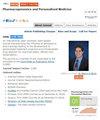Examining an Association of Single Nucleotide Polymorphisms with Hyperuricemia in Chinese Flight Attendants
IF 1.8
4区 医学
Q3 PHARMACOLOGY & PHARMACY
引用次数: 1
Abstract
Background Both genetic and environmental factors strongly affect serum uric acid (SUA) concentrations. The incidence of hyperuricemia tends to be younger in the Chinese population. In particular, we have found a high prevalence of hyperuricemia among Chinese flight attendants, aged from 20 to 40, in our survey. This study aims to evaluate whether there is an association between gene polymorphisms and hyperuricemia among Chinese flight attendants. Methods A total of 532 flight attendants with high and normal serum uric acid levels were recruited. Allele-specific polymerase chain reaction (AS-PCR) was performed using blood samples of enrolled subjects. Results Previous studies have reported single nucleotide polymorphisms (SNPs) that are tightly associated with uric acid levels. Among them, six SNPs that are strongly associated with SUA or gout in Asians, for instance ABCG2 (rs2231142, rs72552713 and rs2231137), GCKR (rs780094), SLC2A9 (rs1014290) and SLC17A1 (rs1183201), were selected for AS-PCR analyses. We found that SNPs such as ABCG2 rs2231142, GCKR rs780094 and SLC2A9 rs1014290 are strongly associated with hyperuricemia in male flight attendants, and SLC2A9 rs1014290 among female flight attendants. Conclusion Our study provides evidences of an association between SNPs and hyperuricemia in the Chinese flight attendants, and highlights the significance of improving diagnostics and prevention of disease development in uric acid metabolism disorders and gout using these SNPs.中国空乘人员单核苷酸多态性与高尿酸血症的关系研究
背景遗传和环境因素都强烈影响血清尿酸(SUA)浓度。高尿酸血症的发病率在中国人群中趋于年轻化。特别是,在我们的调查中,我们发现20至40岁的中国乘务员高尿酸血症的患病率很高。本研究旨在评估中国乘务员的基因多态性与高尿酸血症之间是否存在关联。方法对532名血清尿酸水平高、正常的乘务员进行调查。使用入选受试者的血液样本进行等位基因特异性聚合酶链反应(AS-PCR)。结果已有研究报道单核苷酸多态性(SNPs)与尿酸水平密切相关。其中,选择6个与亚洲人SUA或痛风密切相关的SNPs,例如ABCG2(rs2231142、rs72552713和rs2231137)、GCKR(rs780094)、SLC2A9(rs1014290)和SLC17A1(rs1183201)进行AS-PCR分析。我们发现ABCG2 rs2231142、GCKR rs780094和SLC2A9 rs1014290等SNPs与男性空乘人员的高尿酸血症密切相关,而SLC2A9s 1014290与女性空乘人员密切相关。结论我们的研究为中国空乘人员的SNPs与高尿酸血症之间的关系提供了证据,并强调了使用这些SNPs改善尿酸代谢紊乱和痛风的诊断和预防疾病发展的意义。
本文章由计算机程序翻译,如有差异,请以英文原文为准。
求助全文
约1分钟内获得全文
求助全文
来源期刊

Pharmacogenomics & Personalized Medicine
Biochemistry, Genetics and Molecular Biology-Molecular Medicine
CiteScore
3.30
自引率
5.30%
发文量
110
审稿时长
16 weeks
期刊介绍:
Pharmacogenomics and Personalized Medicine is an international, peer-reviewed, open-access journal characterizing the influence of genotype on pharmacology leading to the development of personalized treatment programs and individualized drug selection for improved safety, efficacy and sustainability.
In particular, emphasis will be given to:
Genomic and proteomic profiling
Genetics and drug metabolism
Targeted drug identification and discovery
Optimizing drug selection & dosage based on patient''s genetic profile
Drug related morbidity & mortality intervention
Advanced disease screening and targeted therapeutic intervention
Genetic based vaccine development
Patient satisfaction and preference
Health economic evaluations
Practical and organizational issues in the development and implementation of personalized medicine programs.
 求助内容:
求助内容: 应助结果提醒方式:
应助结果提醒方式:


